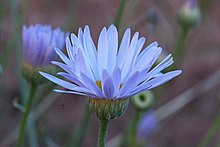| Erigeron utahensis | |
|---|---|

| |
| Conservation status | |
 Apparently Secure (NatureServe) | |
| Scientific classification | |
| Kingdom: | Plantae |
| Clade: | Tracheophytes |
| Clade: | Angiosperms |
| Clade: | Eudicots |
| Clade: | Asterids |
| Order: | Asterales |
| Family: | Asteraceae |
| Genus: | Erigeron |
| Species: | E. utahensis |
| Binomial name | |
| Erigeron utahensis A.Gray | |
| Synonyms | |
| |
Erigeron utahensis is a North American species of flowering plant in the family Asteraceae known by the common name Utah fleabane.
Erigeron utahensis is native to the western United States in Arizona, Utah, western Colorado, northwestern New Mexico, and southeastern California (Providence Mountains inside Mojave National Preserve in San Bernardino County).
Erigeron utahensis is a perennial herb up to 60 cm (2 feet) tall, growing from a stout taproot and a branching underground caudex. Its branching stem and leaves are covered in whitish hairs. The inflorescence holds 1-5 flower heads, each 1-2 centimeters (0.4-0.8 inches) wide. They have yellow disc florets in the centers and 28–40 white, pink, lavender, or ray florets around the edges.
References
- ^ Flora of North America, Erigeron utahensis A. Gray, 1880. Utah fleabane
- Biota of North America Program 2014 county distribution map
- Calflora taxon report, University of California
- SEINet, Southwestern Biodiversity, Arizona Chapter, Erigeron utahensis A. Gray, Utah fleabane includes description, photos, distribution map
External links
- Jepson Manual Treatment
- United States Department of AgriculturePlants Profile
- Calphotos Photo gallery, University of California
- Lady Bird Johnson Wildflower Center, University of Texas
- United States Department of the Interior, National Park Service, Arches National Park, Utah Daisy, Erigeron utahensis
| Taxon identifiers | |
|---|---|
| Erigeron utahensis |
|
This Erigeron article is a stub. You can help Misplaced Pages by expanding it. |